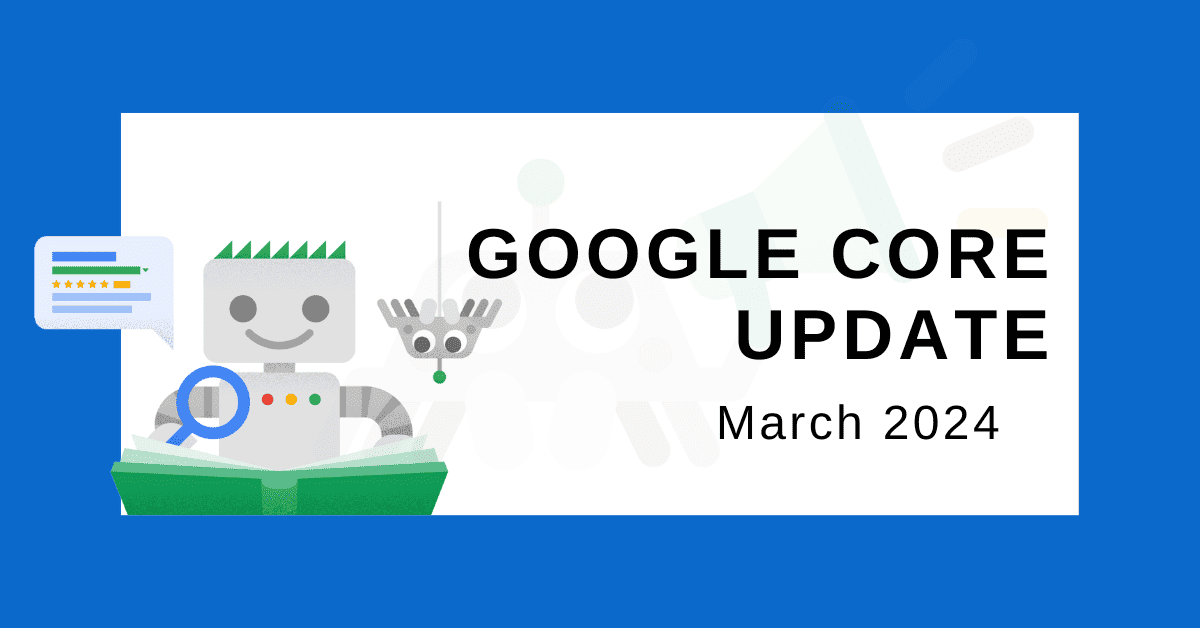Whenever Google drops a new core update, it’s a big deal for us folks who write for the web. It’s like the rules of the game change a bit, and we all need to figure out how to play by them. So, in our team, we have this little tradition. Every time there’s an update, we all huddle up and dive into what’s new, what’s changed, and how we can keep our content on the right side of Google’s latest tweaks.
Today, I had a thought. Why keep all this good stuff just within our team? I mean, we’re all in this together, right? Every writer out there trying to make their content stand out could use a little heads-up on what Google’s looking for now. So, I decided, why not share what we’ve figured out with everyone? That’s why I’m writing this blog called “31 Things Writers Should Know about Google’s March 2024 Core Update.”
This isn’t going to be some high-and-mighty lecture. Just think of it as a casual chat over coffee, where I tell you about what we’ve learned from the latest update. We’re all trying to get our content to shine, so let’s help each other out. Let’s dive in and make sure we’re all up to speed with what Google wants to see in our work.
Key Highlights from Google’s April 2024 Core Update
Here’s a straightforward rundown of the key points from the latest update,
- Encouragement for High-Quality Content Creation: The update reiterates Google’s long-standing advice to focus on creating high-quality, engaging content meant to provide real value to users.
- Complex Algorithm Changes: This update isn’t just a small tweak; it’s a big one that touches multiple parts of how Google decides what’s good content and what’s not.
- Avoiding Expired Domain Abuse: Don’t try to game the system by using old domains to host low-quality content.
- Crackdown on Scaled Content Abuse: Creating tons of low-quality content, whether by humans or AI, just to rank in search, is a no-go.
- Strengthened Actions Against Spam: With the introduction of new spam policies, Google underscores its commitment to maintaining a clean, trustworthy search experience by penalizing sites that engage in manipulative practices.
- Focus on User Experience: Sites are encouraged to not only produce quality content but also to ensure that the overall user experience is positive, indicating that UX factors continue to play a crucial role in ranking.
- Policy Against Low-Value Content Strategies: Google explicitly addresses practices that contribute to a poor user experience, such as thin content or content that doesn’t add new insights or value.
- FAQs on Coupon Content and Third-Party Collaborations: Google addresses specific scenarios, such as coupon sections produced with third-party involvement, highlighting the importance of transparency and value in such content offerings.
Why Writers Should Know About This Content Update and Why It Matters to Them
Writers should pay close attention to Google’s March 2024 core update and new spam policies because these changes directly influence how content is valued and ranked on the web.
This update is a clear signal from Google that the quality of content, its usefulness to readers, and adherence to ethical SEO practices are more crucial than ever.
For writers, this means a shift towards creating content that genuinely serves the audience’s needs, offering clear, valuable, and engaging information. Understanding and adapting to these changes is not just about improving visibility in search results; it’s about contributing to a more trustworthy and high-quality internet.
This update underscores the importance of originality, user-focused content creation, and the avoidance of spammy practices, guiding writers to succeed in a competitive digital landscape while maintaining integrity and providing real value to their readers.
31 Things Writers Should Know about March Core Update
Here are 31 key insights, each designed to help writers navigate and thrive under the new guidelines
1. Quality Over Quantity
The update prioritizes content that offers genuine value over a large volume of low-quality posts. Focus on creating well-researched, insightful articles that address your readers’ needs and questions.
2. User Experience is Paramount
Ensure your content is not just informative but also enjoyable to read. A good user experience—marked by easy navigation, fast loading times, and mobile responsiveness—can positively impact your rankings.
3. Originality Counts
Google’s looking for content that brings new information or perspectives to the table. Avoid rehashing existing content and strive to produce original insights, analysis, or stories.
4. E.E.A.T. is More Important Than Ever
E-E-A-T (Experience, Expertise, Authoritativeness, and Trustworthiness) remain critical. Showcase your credentials and ensure your content reflects your expertise to build trust with both your audience and Google.
5. Adapt to AI Content Guidelines
With AI-generated content becoming more common, Google emphasizes originality and human touch. If you use AI, ensure the output is thoroughly edited to add value and uniqueness.
6. Avoid Spammy Techniques
Steer clear of black-hat SEO tactics such as keyword stuffing or cloaking. Google’s smarter at spotting these and will penalize sites employing such practices.
7. Respond to the Audience’s Intent
Content should directly answer the questions or solve the problems that your audience is searching for. Aligning with user intent is key to ranking well.
8. Long-form Content Still Wins
In-depth articles that cover a topic comprehensively tend to perform better. However, ensure every part of your content serves a purpose and adds value.
9. Optimize for Featured Snippets
Answering questions directly and clearly can help your content get picked for featured snippets, which appear at the top of Google search results.
10. Keep Content Fresh
Regularly update older content to keep it relevant and accurate. This shows Google that your site remains a valuable, current resource.
11. Expand Your Content-Range
Diversify your content types to include videos, podcasts, and infographics. Different formats can help meet varied user preferences and needs.
12. Understand Voice Search
Optimize for voice search by including conversational phrases and questions in your content, as more users rely on voice-activated devices.
13. Pay Attention to Content Depth
Depth of content—not just length—is important. Cover your topic thoroughly, providing unique insights or comprehensive solutions to stand out.
14. Use Keywords Naturally
Keywords should fit seamlessly into your content. Overuse can hurt readability and rankings, so prioritize natural, contextually relevant placement.
15. Visual Content is a Plus
Images and videos can enhance your content’s appeal and engagement. Use high-quality visuals that are relevant to your text and optimized for fast loading.
16. Internal Linking Boosts SEO
Link to other relevant pages within your site to help Google understand your site structure and keep visitors engaged longer.
17. Avoid Duplicate Content
Publishing the same or very similar content across multiple pages can confuse search engines and dilute your rankings
18. Answer the Readers’ Questions Upfront
Begin your articles by directly addressing the question or problem posed in the search query. This aligns with Google’s aim to provide users with the information they seek quickly.
19. Use Subheadings for Better Structure
Break your content into manageable sections with clear subheadings. This makes it easier for readers to navigate and for Google to understand the main points of your content.
20. Stay Informed on Your Niche’s Latest Trends
Keeping abreast of the latest developments in your field not only makes your content more relevant but also positions you as an authoritative source. Google favors content that reflects current knowledge and expertise.
21. Highlight Key Takeaways
Begin or end your articles with a summary of key points. This helps readers quickly grasp the essence of your content and aligns with Google’s goal of providing value efficiently.
22. Leverage Data and Research
Backing up your claims with data and research not only boosts your content’s credibility but also its value in Google’s eyes. Cite reputable sources to enhance trustworthiness.
23. Utilize FAQs Within Your Content
Incorporate frequently asked questions related to your topic within your articles. This can increase your chances of appearing in voice searches and featured snippets.
24. Encourage Engagement
End your posts with a call-to-action, inviting comments or questions. Engaged readership signals to Google the value and relevance of your content.
25. Focus on In-depth, Expert Product Reviews
If you write product reviews, go beyond superficial analysis. Google is encouraging content that comes from first-hand experience, providing detailed, expert insights into the product being reviewed.
26. Make Your Content Comprehensive and Satisfying
After reading your content, the reader should feel they’ve learned enough to achieve their goal or satisfy their query. Ensure your content is comprehensive, leaving readers with a sense of satisfaction.
27. Avoid Creating Content Solely for SEO
Question the primary motivation behind your content creation. If it’s mainly to rank well in search engines rather than to inform or help your audience, it’s time to reconsider your approach.
28. Focus on the “Why” Behind Your Content
The primary motivation for creating any piece of content should be to help and inform your audience. Content created with the intent to serve real human interests and needs is more likely to align with Google’s updated guidelines and succeed in search rankings.
29. Use Clear and Direct Language
Communicate your ideas clearly and avoid unnecessary jargon. Direct, understandable language helps make your content more accessible to a wider audience.
30. Adapt Content Structure for Clarity
Use headings, subheadings, bullet points, and short paragraphs to structure your content for clarity. A well-organized article improves readability and user experience.
31. Avoid Misleading Headlines or Promises
Ensure your headlines accurately reflect the content of your article. Avoid sensationalism or misleading promises that could disappoint or mislead readers.
How to Self-Assess Your Content for Google’s March 2024 Core Update
Evaluating your own writing can sometimes feel like navigating a maze. You’re aiming for that sweet spot where your content not only resonates with your audience but also aligns with Google’s guidelines, especially after the latest updates. Here’s a simplified approach to self-assessing your content, ensuring it hits the mark for both readers and search engines.
1. Check for Originality
Ask yourself, “Am I offering something new?” Whether it’s a unique insight, personal analysis, or original research, your content should add value that readers can’t easily find elsewhere.
2. Ensure Depth and Completeness
Does your content fully explore the topic? Your writing should leave readers feeling informed and satisfied, covering the necessary breadth and depth without leaving them with more questions.
3. Provide More Than the Obvious
Look at your article and see if it goes beyond surface-level information. Aim to give readers that “aha” moment with insights they won’t just stumble upon anywhere.
4. Add Your Own Flavor to Sourced Content
If you’re drawing from other sources, ensure you’re not just echoing what’s already out there. Blend in your unique perspective or additional information to make it stand out.
5. Craft Your Titles Carefully
Your title should be like a promise to your readers – one that the content fulfills. Avoid sensationalism that doesn’t match the depth of your article.
6. Aim for Bookmark-Worthy Content
Would someone save your article for later or share it with a friend? That’s a good sign you’re providing value that resonates on a personal level.
7. Strive for Print-Worthy Quality
Imagine your content in a prestigious magazine or book. If it feels right at home there, you’re likely meeting high standards of quality and reliability.
8. Stand Out in Search Results
Consider how your content compares to others on the same topic in search results. Aim for your piece to provide unique value that makes it a go-to resource.
9. Mind the Quality of Production
Quality isn’t just about what you say, but how you present it. Sloppy formatting or errors can detract from your content’s credibility.
10. Avoid Mass Production Pitfalls
Content that feels mass-produced or generic can diminish its value. Focus on crafting each piece with attention and care, even if it means producing less. We have covered here how we manage bulk content writing projects by making sure that quality of content remains top notch.
11. Validate Your Expertise
Does your content reflect a deep understanding or firsthand experience of the topic? Being clear about your qualifications or experience can enhance trust and authority.
12. Fact-Check Rigorously
Double-check your facts and figures. Credible content is accurate content, and even small errors can undermine your credibility.
13. Assess Page Experience
Your content isn’t just what you write; it’s how readers interact with it on your page. Ensure a smooth, enjoyable experience for everyone, regardless of device or browser.
14. Reflect on Your Motivations
Be honest about why you’re creating this content. If the primary goal is to serve your audience’s needs and interests, you’re on the right track.
Self-assessment isn’t about being overly critical but rather about embracing continuous improvement. By asking these questions, you’re not just evaluating your content for today’s standards but preparing it to shine in the ever-evolving landscape of search and reader expectations.
Wrapping Up
So, we’ve walked through a lot together, from what Google’s latest update means to how you can make sure your writing hits the mark. We talked about making content that’s not just for the sake of filling up space on the internet but actually means something to the people who read it. We also covered how to check if your work is really doing its job well.
Here’s the thing: writing good stuff, the kind that people and Google both love, isn’t always easy. It takes a bit of effort, some know-how, and a whole lot of keeping it real. But the cool part is, you don’t have to do it alone.
If you’re looking to get your ideas out there, to share something that’s genuinely helpful and interesting but you’re not quite sure how to make it all click, we’ve got your back. At Wordscloud, we’re all about creating content that matters. Content that’s first and foremost for people, not just to tick boxes for search engines.
So, if you want content that’s ready to rock right out of the gate, content that truly speaks to your audience and stands out in the sea of online information, come talk to us. We’re here to help you make that happen. Let’s create something great together.
How will March 2024 Core update affect my website’s content?
The Google March 2024 Core Update is designed to refine the search engine’s ability to identify and promote content that is most useful and relevant to users’ queries. This update will affect website content by prioritizing pieces that demonstrate high-quality, originality, and a strong focus on providing value to the reader.
Specifically:
Content Quality and Depth: Websites featuring well-researched, in-depth content that addresses the users’ intent comprehensively are likely to see a positive impact. This content should offer insights, analysis, or information not readily available elsewhere.
User Experience: The update places importance on the overall user experience, including the readability, navigability, and mobile-friendliness of content. Websites that ensure a smooth, engaging user experience can expect to perform better in search rankings.
Originality and Expertise: Content that showcases original reporting, unique perspectives, and expert knowledge in its field is favored. Websites should aim to produce content that reflects genuine expertise and adds new value to the topic at hand.
E-E-A-T (Expertise, Authoritativeness, Trustworthiness, and Experience): The update reinforces the significance of E-E-A-T as a measure of content quality. Sites that can demonstrate these qualities through their content are more likely to be viewed favorably by the update.
Penalties for Low-Quality Practices: Conversely, content that appears to be created primarily for search engine rankings rather than to inform or help users, such as keyword-stuffed articles, clickbait, or thin content offering little to no value, may be negatively impacted. The same goes for practices like using expired domains for spam or engaging in manipulative link schemes.
How does the Google March 2024 Core Update view AI-generated content?
Google’s March 2024 Core Update continues its long-standing policy that using automation, including generative AI, to produce content primarily for manipulating search rankings is considered spam. This stance is consistent with previous guidelines but has been expanded to address more advanced and less obvious forms of scaled content creation, whether through automation or human efforts. The essence is that producing large quantities of content, especially if it’s of low quality or aimed at merely affecting search rankings rather than providing genuine value to users, violates Google’s guidelines. This applies regardless of whether the content is generated by AI or humans, emphasizing the importance of originality, quality, and value in content creation.
Can I still rank well if my site covers a broad range of topics?
Yes, but each piece of content should demonstrate expertise and provide value on its specific topic. Avoid diluting quality by spreading too broadly without sufficient depth.
What role does user engagement play in March 2024 core update?
Engagement signals like time on page, bounce rate, and user interactions can indirectly influence rankings by indicating content quality and relevance to Google.
What should I do if my content’s ranking drops after the march 2024 core update?
If your content’s ranking drops following the March 2024 core update, you should re-evaluate your content against Google’s updated guidelines, focusing on enhancing quality, relevance, and user experience. Here’s a structured approach based on the provided guidelines:
Review for Originality and Value: Ensure your content offers original insights, comprehensive coverage, and goes beyond what’s obvious. It should add substantial value compared to other sources available.
Assess Depth and Expertise: Make sure your content demonstrates deep knowledge of the subject. It should reflect expertise, authoritativeness, and trustworthiness (E-E-A-T), providing users with accurate, insightful information.
Enhance User Experience: Check that your site offers a positive user experience, including mobile responsiveness, fast loading times, and easy navigation. A good page experience encourages longer visits and higher engagement.
Update and Improve Existing Content: Identify pages that were most impacted by the update. Update outdated content, correct inaccuracies, and enhance articles with new, relevant information to make them more helpful and comprehensive.
Focus on People-first Content: Realign your content strategy to prioritize the needs and interests of your audience over search engine optimization tactics. Content should be created to inform and help your readers, not just to rank well in search engines.
Use AI and Automation Ethically: If you’re using AI-generated content, ensure it’s thoroughly reviewed and edited to maintain quality and originality. Disclose the use of AI where necessary and avoid relying solely on automation for content creation.
Solicit Feedback and Perform Audits: Consider getting feedback from unbiased third parties who can provide honest assessments of your content. Also, conducting a thorough audit of the content that dropped in rankings can reveal areas for improvement.
By taking these steps, you can better align your content with Google’s focus on high-quality, user-centric information, potentially recovering or even improving your rankings post-update. Remember, Google’s algorithms are complex and constantly evolving, so continuous adaptation and improvement are key to long-term SEO success.
Is there a preferred word count for articles post March 2024 core update?
No, Google does not specify a preferred word count. The focus should be on meeting the user’s needs comprehensively, whether that’s achieved in a few hundred words or requires a longer, in-depth article.
Will refreshing old content help my rankings after March 2024 core update?
Google emphasizes the importance of keeping content up to date and relevant. According to Google, “Regularly updating older content to keep it relevant and accurate” is encouraged as it shows that your site remains a valuable and current resource. While Google does not explicitly say that refreshing old content will directly boost rankings, it implies that maintaining the accuracy and freshness of your content can positively impact its overall quality and relevance, which are critical factors in search rankings. Thus, keeping your content current and in line with the latest information and trends is aligned with providing a good user experience, which Google values.
What does Google say about the frequency of content updates?
While Google does not specify an optimal frequency for content updates, it emphasizes the importance of keeping content relevant and accurate, suggesting that ‘regularly updating older content’ can contribute to a site being seen as a valuable resource.
How important are keywords after the March 2024 Core Update?
While keywords remain an important part of SEO, the focus should be on creating content that naturally incorporates keywords in a way that aligns with delivering value to the reader, rather than keyword stuffing or other manipulative practices.
Does Google prefer long-form content over short-form content?
Google does not express a preference for long-form over short-form content. The key is whether the content provides a substantial, complete, or comprehensive description of the topic, regardless of length.
Can small or new websites compete with established sites after the march 2024 update?
Google’s core ranking systems aim to prioritize content that demonstrates expertise, authoritativeness, and trustworthiness, regardless of the site’s size. New or small websites can compete by focusing on creating high-quality, people-first content
Is there a penalty for using AI to generate content?
According to Google, the use of automation, including generative AI, for creating content primarily to manipulate search rankings is considered spam. Google’s stance is that content should serve the user’s needs first and foremost, rather than being designed to rank well in search engines. The guiding principle is that “our algorithms are created by humans for humans,” emphasizing the importance of content that is genuinely useful, informative, and engaging to readers.
While Google does not issue direct penalties for merely using AI to generate content, the critical factor is the purpose behind using AI and the quality of the content produced. If AI-generated content is used to spam or manipulate rankings with low-quality or irrelevant information, it could negatively impact a site’s visibility in search results. Google encourages content creators to focus on creating high-quality, original content that adds substantial value for users, whether or not AI is part of the content creation process.
Where can I find official information or updates about the core update?
Google’s Search Liaison Twitter account and Google Search Central Blog are the primary sources for official announcements and information on core updates and other changes to Google Search.









